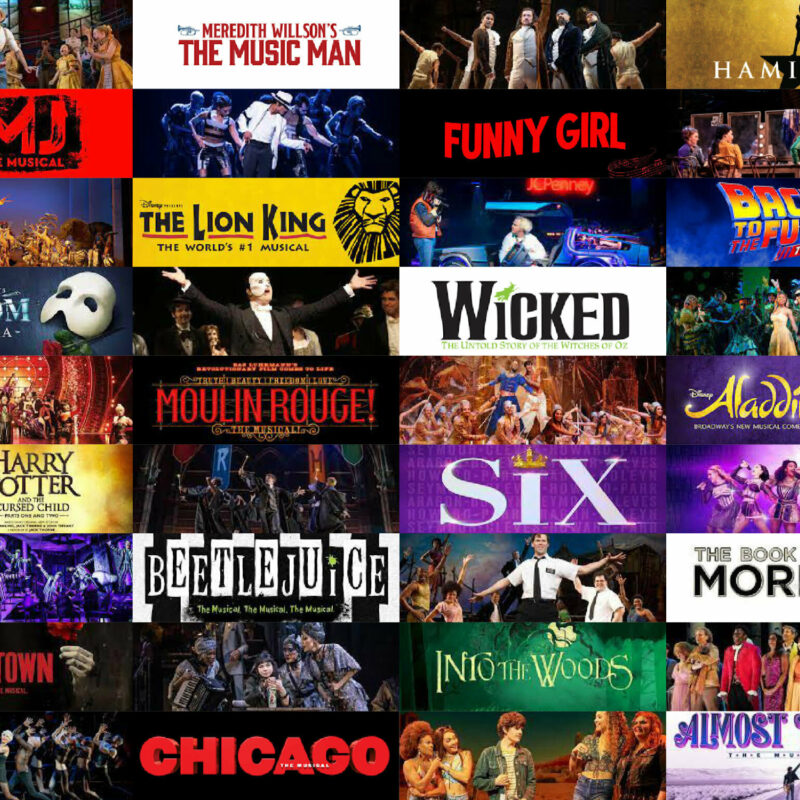Broadway musicals are considered a cornerstone of American culture, reflecting societal issues and evolving with the times through their narratives and characters.

Broadway is the oldest north-south street in New York City. It existed as a path traveled by American Indians long before Europeans arrived. Today, there are many famous sites along the several miles of Broadway. This famous section of Broadway is known as the Theater District. You will also often hear it called ‘The Great White Way.’ Where did this nickname come from? It started when Broadway became one of the first streets in the U.S. to be lit with electric lights. The nickname remains popular today. Millions of lights on theater marquees and billboard advertisements help brighten the night sky. The Theater District is home to 40 large professional theaters. Each of these theaters seats 500 or more people. They host a constantly changing variety of productions, including plays and musicals.
The Music Man (1957-1961, 2021-2023)
The main character of The Music Man is a con man named Professor Harold Hill. He travels throughout the Midwest posing as a music instructor for boys’ bands. He sells uniforms and instruments to hopeful young groups of musicians and promises to train them to become successful bands. But he doesn’t know the first thing about teaching — so once he gets the boys’ money, he skips town before teaching them a single note.
The Music Man kicks off when he arrives in River City, Iowa, with plans to enact his scheme there. He convinces the townsfolk that the town’s new pool table will lead all their boys to corruption, so he promises to teach them music to keep them upright. But the local librarian, Marian Paroo — who happens to double as an actual piano teacher — sees right through his lies and resolves to expose him. The only problem is, that some things about Harold Hill turn out to be true. He shows genuine care for her younger brother, who lisps and helps him gain real confidence in himself, endearing Marian to him. Her plan to expose Harold as a fraud suddenly gets complicated as she develops real feelings of her own for him.
The Music Man first premiered on Broadway more than 60 years ago, on December 19, 1957. That production ran for 1,375 performances, closing in 1961, and received six Tony Awards including Best Musical.
The 2021 production is the musical’s second Broadway revival, following one in 2000. Performances were supposed to begin in 2020 but were delayed by the pandemic; The Music Man finally began performances on December 20, 2021, and opens on February 10, 2022.
Cats (1982-2000)
The original Broadway production of the Andrew Lloyd Webber musical, Cats, premiered in the Winter Garden Theatre on October 7, 1982, after previews that began on September 23, 1982. It played a total of 7,485 performances and 15 previews. It was the second production of Cats to open worldwide, following the original London Production. In transferring to Broadway, the show was given a significant overhaul with a much bigger budget. Many of the subsequent productions worldwide were based on the Broadway version of the musical. The show won seven Tony Awards in 1983, including Best Musical, Best Book, and Best Original Score.
This production made Cats the longest-running show in Broadway history from 19 June 1997 until 9 January 2006. In 2016, the musical was revived on Broadway in a reworked production. After the success of the London production, there was an intense bidding war among American producers to bring the show to Broadway, with The Shubert Organization and David Geffen eventually winning the Broadway rights to Cats. Many changes were made to the show at the insistence of the new producers, to better appeal to Broadway audiences and critics. Most of these changes concerned upping the production values and spectacle but also included major revisions to the London score.
Evita (1979-1983)
The original Broadway production of Evita opened at the Broadway Theatre on September 25, 1979. The production, directed by Harold Prince with choreography by Larry Fuller, played 17 previews and 1,567 performances before closing on June 26, 1983. The production earned 11 Tony Award nominations, winning seven including Best Musical and for stars Patti LuPone and Mandy Patinkin.
Based on the life of Eva Perón, Evita tells the story of an obscure and ambitious actress who becomes the powerful and controversial first lady of Argentina. The musical features music by Andrew Lloyd Webber and a book and lyrics by Tim Rice. Evita starred LuPone as Eva Perón, Patinkin as Che, Bob Gunton as Peron, Terri Klausner as Eva Perón/Person of Argentina, Jane Ohringer as Perón’s Mistress, and Mark Syers as Magaldi, with ensemble members Seda Azarian, Dennis Birchall, Peppi Borza, tom Carder, Robin Cleaver, Anny De Gange, Mark East, Megan Forste, Bridget Francis, Nicole Francis, Teri Gill, Carlos Gorbea, Pat Gorman, Rex David Hayes, Michael Lichtefeld, Carol Lugenbeal, Paula Lynn, Morgan MacKay, Peter Marinos, Sal Mistretta, Jack Neubeck, Marcia O’Brien, Nancy Opel, Michael Pastryk, Davia Sacks, James Sbano, David Staller, Michelle Stubbs, Robert Tanna, Clarence Teeters, Susan Terry, Phillip Tracy, David Vosburgh, Mark Waldrop, Sandra Wheeler, Brad Witsger, John Leslie Wolfe, Nancy Wood, and John Yost.
The production featured scenic, costume, and projection design by Timothy O’Brien and Tazeena Firth, lighting design by David Hersey, and sound design by Abe Jacob with stage management by George Martin, John Grigas, and Carlos Gorbea.
West Side Story (1957-1959)
The original Broadway production of West Side Story opened at the Winter Garden Theatre on September 26, 1957. The Leonard Bernstein, Stephen Sondheim, and Arthur Laurents musical, based on Shakespeare’s Romeo and Juliet, played 732 performances before closing on June 27, 1959. West Side Story follows two teens from the bitter-enemy gangs, the Sharks and the Jets, as they meet and fall in love at a fateful gym dance. The original Broadway production starred Larry Kent as Tony, Carol Lawrence as Maria, Ken Le Roy as Bernado, Chita Rivera as Anita, Mickey Calin as the Riff, Art Smith as Doc, Lee Becker as Anybody’s, Grover Dale as Snowboy, Arch Johnson as Schrank, Tony Mordente as A-Rab, Eddie Roll as Action, David Winter as Baby John, Tommy Abbott as Gee-Tar, William Bramley as Krumpke, Hank Brunjes as Diesel, Erne Castaldo as Toro, Martin Charnin as Big Deal, Marilyn Cooper as Rosalia, Wilma Curley as Graziella, Carole D’Andrea as Velma, Al De Sio as Luis, Marilyn D’Honau, Gene Gavin as Anxious, Frank Green as Mouth Piece, Reri Grist as Consuela, Carmen Gutierrez as Teresita, John Harkins as Gladhand, Lowell Harris as Tiger, Ronnie Lee as Nibbles, George Marcy as Pepe, Jack Murray as Moose, Jay Norman as Juano, Julie Oser as Pauline, Liane Plane as Marguerita, Nanette Rosen as Minnie, Lynn Ross as Estella, Jamie Sanchez as Chino, Noel Schwartz as Indio, and Elizabeth Taylor as Francisca. Rounding out the company were Stephanie Augustine, Muriel Bentley, and Marlys Watters as standbys and Larry Roquemore and Marc Scott as swings.
The production, directed and choreographed by Jerome Robbins with co-choreography by Peter Gennaro, featured scenic design by Oliver Smith, costume design by Irene Sharaff, lighting design by Jean Rosenthal, and sound design by Sound Associates, Inc. with stage management by Ruth Mitchell and Harry Howell. For the complete cast and creative team, visit PlaybillVault.com/WestSideStory. A film version starring Natalie Wood, Richard Beymer, Rita Moreno, and George Chakiris (who was a member of the original London cast) was released in 1961. The musical has since returned to Broadway five times, most recently in an Ivo van Hove-helmed revival, which opened at the Broadway Theatre on February 20, 2020.
Annie (1977-1983)
The original Broadway production of Annie opened at the Alvin Theatre (now the Neil Simon) on April 21, 1977. The production dominated the 1977 Tony Awards, earning 11 nominations and winning for Best Musical, Score, and Book. Andrea McArdle received a Tony nomination for Best Lead Actress in a Musical for her role as the title character, but the award went to her co-star, Dorothy Loudon, who played Miss Hannigan.
After nearly six years and 2,377 performances, Annie closed on January 2, 1983. Based on the popular Harold Gray comic strip, Annie tells the story of a spunky orphan girl finding a home with a New York millionaire during the Depression while dodging the clutches of her evil orphanage mistress. The musical features music by Charles Strouse, lyrics by Martin Charnin, and a book by Thomas Meehan.
The original production starred McArdle as Annie, Reid Shelton as Daddy Warbucks, Loudon as Miss Hannigan, Sandy Faison as Grace Farrell, Robert Fitch as Rooster Hannigan, and Diana Barrows as Tessie. The ensemble featured Laurie Beechman, Danielle Brisebois, Shelley Bruce, Barbara Erwin, Robyn Finn, Donna Graham, Janine Ruane, Raymond Thorne, James Hosbein, Steven Boockvor, Edwin Bordo, Edie Cowan, Donald Craig, Richard Ensslen, Bob Freschi, Mari McMinn, and Penny Worth. Rounding out the company were Kristen Vigard as the standby for Annie, Don Bonnell as swing, and Rymond Thorne and Mimi Wallace as understudies.
Directed by Charnin with choreography by Peter Gennaro, Annie featured scenic design by David Mitchell, costume design by Theoni V. Aldredge, and lighting design by Judy Rasmuson with stage management by Janet Beroza, Jack Timmers, and Patrick O’Leary. Following the original Broadway production, Annie returned to the Main Stem in 1997 starring Brittny Kissinger, and once more in 2012 starring Lilla Crawford.
Many people believe the theatrical productions on Broadway are the best in the world. Each year, the best Broadway shows are awarded Tony Awards. Broadway shows are one of the most popular tourist attractions in New York City. In 2010, shows sold more than $1 billion in tickets! As you can see, many of the shows are popular and quite profitable. For that reason, they often run for years and years. Shows close when they stop drawing new audiences and become unprofitable.

















